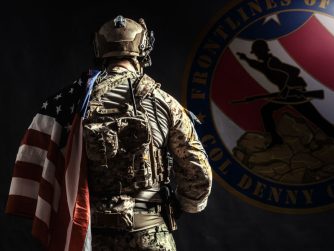Our military is well down the path of becoming a force with virtually no combat readiness—as all of our NATO allies have already done—as we’ve discussed earlier. And all this during a very dangerous time in history.
My focus last time was on the terribly negative impact on morale of the forced inclusion of women in our military’s close-combat units—by close-combat I mean Army and Marine infantry and armor and Special Ops forces like Army Rangers and Navy SEALs.
The driving factor for all military units must be combat readiness–based on the group’s mission. A military purchasing and contracting office is much different than a cargo aircraft wing, which is very different that an infantry brigade or a SEAL team.
Women have been serving in combat for decades— competently and bravely. However, there is a difference between serving in combat and serving in close-combat. I have a good friend Jim; we’re both Vietnam vets. Jim ran an aircraft maintenance unit there; I ran a rifle company. We were both in combat, but, I was in close-combat; he was not. The issue here is the appropriateness of women serving in close-combat units. Our nation’s civilian leaders have mandated that, as of this year, women must be permitted to serve in close-combat units.
Close-combat units must be prepared to and may have to get face-to-face and hand-to-hand with our enemies. The consequence of failure is not a lawsuit about a goofed-up contract for more bullets—but bloody and horrible death or life-time disability.
The very best book that addresses women deployed with close-combat units is Gayle Lemmon’s Ashley’s War. Lieutenant Ashley White volunteered for, was trained, and deployed with Army Ranger units in Afghanistan. She moved with Ranger units so that when they searched a village there would be someone with whom the Afghan women could talk—as their culture prohibits them from talking with strange men. The team would be inserted by helicopter shortly after dark, hike over several mountain ranges–one never lands near the target– and hit a village. Then they hiked back. Ashley was in top physical condition and was very careful not to cause the Rangers she was with on any given night to be concerned about her—and she was accepted as a team member while on missions. Ashley mentions that while the men would often hydrate a great deal before an operation, she did not—because she did not want to force the team to provide a place for her to urinate. She was always successful, but this raises a question: How close did she come to dehydration? That would have created a real problem. I highly recommend this book. Ashley was later killed in action.
One would expect that a proposed major change like this inclusion of women would be preceded by numerous tests and studies to determine the impact of the change on combat readiness. Yes, such tests were conducted.
The Marines led the way.
*Since 2012 over 30 excellent female Marine officers have attempted the Infantry Officer Course; none have passed.
*Some 100 female volunteers did succeed on the less-demanding infantry course for enlisted personnel, but the Marines had to suspend a requirement of three pull-ups in boot-camp because 55% of female enlistees couldn’t do them.
*Marine strength test results confirmed serious gender-related disparities. In a test simulating stowing artillery rounds, 28% of females, and under 1% of men, were unable to lift and move a 95-pound round in the allotted time.
*The Marines ran a multi-month test comparing the performance in the field of all-male infantry units to mixed-male-and-female units. The all-male units far out performed the mixed units.
The Army participated, too. Women were allowed to attend Ranger School. This course is a tough 9-week leadership course. It has three 3-week phases. Sixteen women along with over 100 men started a class in April 2015. All the women failed the first phase; some were permitted to recycle—selective recycling has always been permitted. Ultimately, two women graduated at the end of August; one more in October. The ladies were recycled and recycled and recycled. They took between five and seven months to pass a two month course.
Clearly, our military spent a lot of time and money looking into allowing women into close-combat units. And this was done at a time when the Pentagon is financially broke; we don’t have enough money to buy spare parts and to train all our tactical units. And, as it turns out, it was a total waste of money.
The results were presented to the Pentagon’s civilian leaders—along with almost unanimous opposition by uniformed military leaders. The results were ignored; the civilians had apparently already made up their minds—facts be damned. Most of the civilian decision makers had never worn the uniform and were seemingly disinterested in combat readiness.
Thus, despite the huge physical differences and the negative impact on combat readiness, women’s bodies are now, by decree, equal to men’s bodies when it comes to close-combat.
Many of our military’s real warriors have been leaving or have been run-out of our armed forces for several years. Our military is being destroyed as a fighting force—and our enemies know this.
Remember this destruction of our military as you are considering your vote for president.



